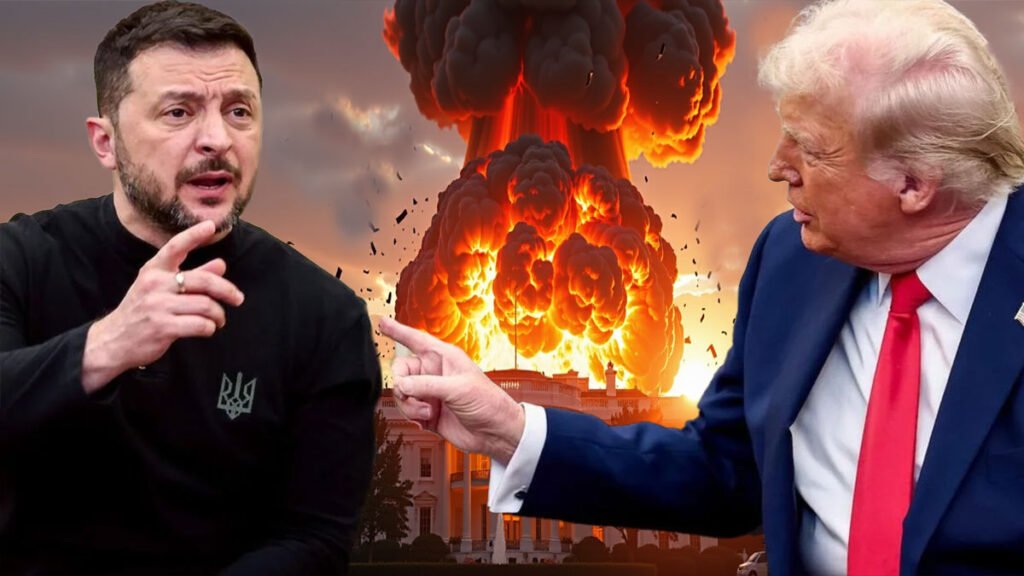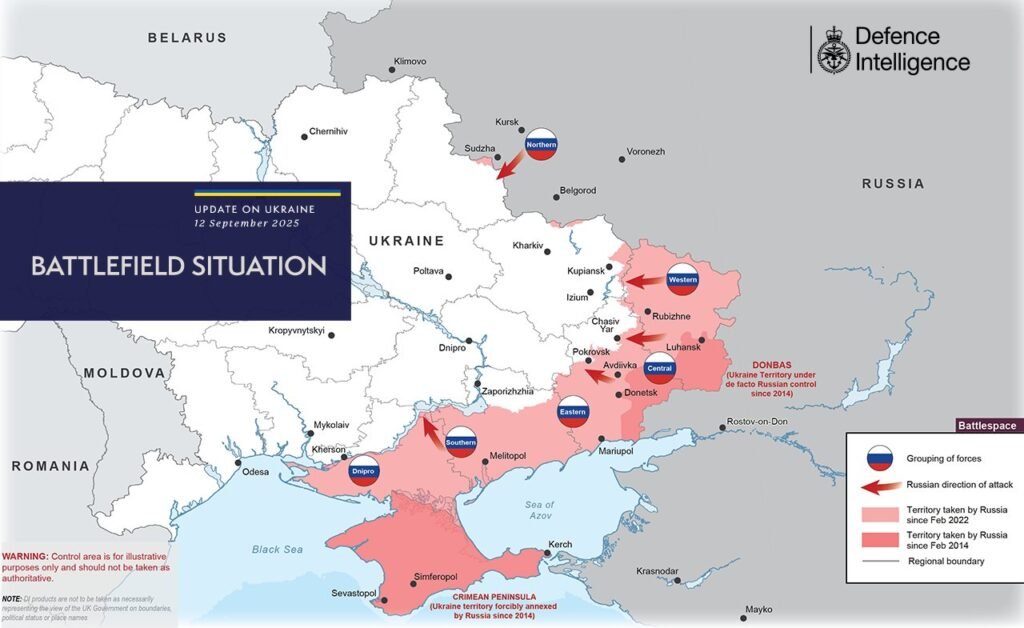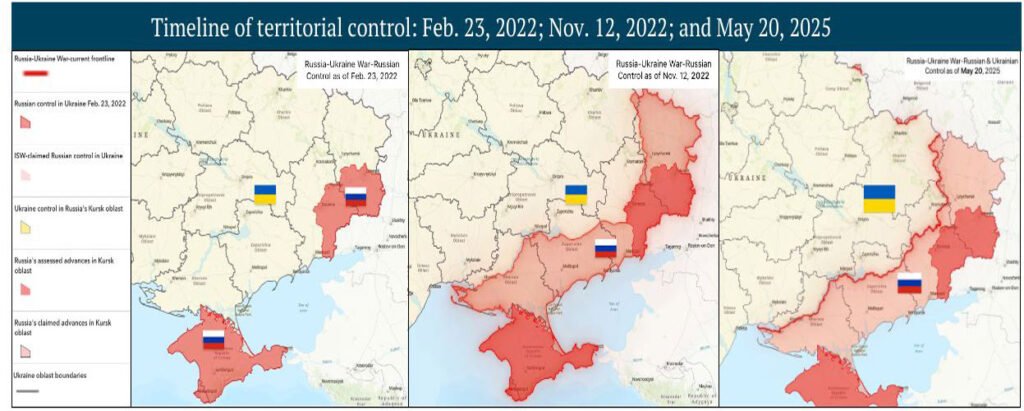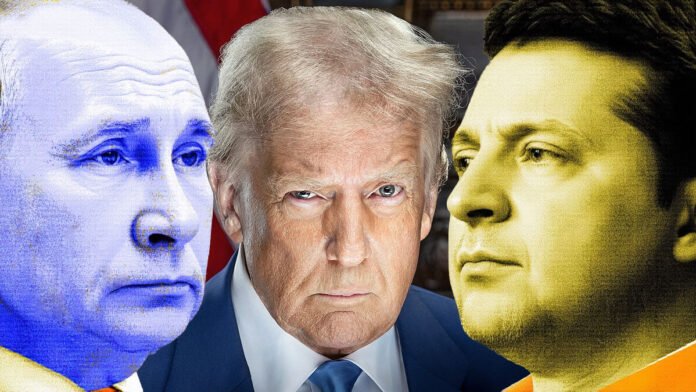Trump’s Ukraine Volte-Face: From Capitulation to Total Victory in 24 Hours
“Cry havoc and let loose the dogs of war”: Shakespeare’s words feel prophetic as Donald Trump executed one of the most dramatic foreign policy reversals in modern presidential history. In a whiplash-inducing about-face, the President abandoned his insistence that Ukraine surrender territory for peace and instead declared that Ukraine could “fight and WIN all of Ukraine back in its original form.”
The stunning reversal came via social media just hours after his meeting with Ukrainian President Volodymyr Zelensky in New York, a complete contradiction of the position Trump had held since his three-hour Alaska summit with Vladimir Putin five weeks earlier. Then, he had insisted Zelensky “face reality” and cede territory to Russia’s superior military might.
Trump offered no explanation for this strategic somersault, leaving European officials speculating that the President was simply washing his hands of a conflict he had once promised to resolve “in days.” His eight months in office have been marked by dizzying inconsistency on Ukraine, from screaming at Zelensky in February (“You don’t have the cards!”) to rolling out red carpets for Putin in Alaska.

The President’s latest declaration sounded almost detached, ending with the curiously neutral: “I wish both Countries well.” Within hours, his own Secretary of State Marco Rubio contradicted him entirely, insisting the war “cannot end militarily” and would require negotiations, precisely Trump’s previous position.
This wasn’t mere policy confusion but diplomatic whiplash. Just weeks ago in Alaska, Trump had promised to broker direct talks between the warring leaders, rejecting calls for ceasefires in favour of comprehensive peace accords. He had even discussed creating a post-war security force with European allies, potentially including American air support for Ukrainian no-fly zones.
Tuesday’s reversal revealed Trump’s growing frustration with Putin, who had apparently embarrassed the President by failing to deliver on promised peace negotiations. Trump’s social media tirade against Russia marked a complete tonal shift: “Russia has been fighting aimlessly for three and a half years, a War that should have taken a Real Military Power less than a week to win. This is not distinguishing Russia.”
He branded Putin’s forces a “paper tiger”, the polar opposite of his previous rhetoric about the nuclear-armed superpower. References to gasoline queues and Moscow’s economic struggles painted Russia as fundamentally weak rather than strategically patient.
The Donbas Bargain

But Ukrainian President Volodymyr Zelensky has consistently said Ukraine would not hand over the Donbas in exchange for peace, saying such a concession could be used as a springboard for future attacks by Russia.
Yet none of these supposed weaknesses were new revelations. Trump never explained why Ukraine, which has steadily lost territory over the past year, could suddenly reverse these losses. As one senior NATO officer noted privately, Ukraine couldn’t gain ground when American aid was at peak levels and Russian forces were less concentrated.
The strategic reality on the ground appears lost on Trump and the hawks from the so called ‘Coalition of the willing’ pushing for escalation. Russia has secured substantial portions of the Donbas region, particularly in Donetsk and Luhansk oblasts, representing significant progress toward their stated territorial objectives in eastern Ukraine.
After nearly three years of grinding warfare, Russian forces have established defensive positions across much of the territory they initially sought to control, making any Ukrainian counteroffensive exponentially more difficult and costly. This territorial consolidation, combined with Russia’s superior air, artillery and manpower advantages, suggests that Trump’s sudden optimism about Ukrainian victory ignores the military fundamentals that have defined this conflict since 2022.

More tellingly, we are left with a glaring contradiction: if Russia truly is the “paper tiger” Trump now claims, why are Western nations scrambling to increase defence budgets to 5% of GDP? Why the urgent calls for expanded NATO capabilities and accelerated weapons production? The simultaneous dismissal of Russian military capacity while demanding massive increases in Western military spending reveals the hollow nature of this latest rhetorical pivot.
You cannot credibly argue that your opponent is militarily insignificant while simultaneously demanding unprecedented peacetime defence expenditures to counter that same opponent. The mathematics of this contradiction suggest that either Trump’s “paper tiger” assessment is dangerously wrong, or the defence spending increases are unnecessary, but both cannot be true.
Crucially, Trump offered no restoration of the billions in military aid he had previously withdrawn, stating merely: “We will continue to supply weapons to NATO for NATO to do what they want with them.” This sleight of hand suggested America would arm NATO rather than Ukraine directly, a distinction that matters more politically than practically, given NATO’s American command structure under General Alexus Grynkewich.
The real decisions about Ukrainian support now rest with major European powers, Britain, France, and Germany, alongside NATO Secretary General Mark Rutte. Trump’s statement effectively transferred responsibility while maintaining rhetorical support for Ukrainian victory.
Zelensky, demonstrating the diplomatic survival instincts that have sustained him through this war, embraced Trump’s reversal enthusiastically. The same President who had screamed at him months earlier was now praised as being “more close now to the situation” and dubbed a “game-changer.”
Whether this constitutes an actual game-change remains unclear. Trump’s Tuesday declaration that NATO members could shoot down Russian aircraft in their airspace carried potential for escalation, especially given recent Russian incursions over Estonia and drone flights deep into Poland. Yet when pressed on backing allies in potential air combat, Trump hedged: “it depends on the circumstances.”
The strategic implications multiply. Putin had clearly calculated after Alaska that Trump lacked appetite for prolonged conflict or massive aid commitments. The President’s apparent reversal might simply confirm Russian assumptions about American inconsistency while providing political cover for continued European support.
Alternatively, Putin might interpret this as American re-engagement and respond with escalated aggression, betting that time and attrition still favour Russian victory regardless of presidential rhetoric.
Trump’s Ukraine policy now embodies the chaos of his broader foreign policy approach, grand declarations followed by tactical reversals, strong words accompanied by limited commitments, personal relationships trumping strategic consistency. For Ukraine, such volatility represents perhaps the greatest threat of all: allies whose support shifts with presidential moods rather than national interests.
We should all remember, once The dogs of war are released, they rarely respond to their master’s changing commands.
Support Independent Journalism Today
Our unwavering dedication is to provide you with unbiased news, diverse perspectives, and insightful opinions. We're on a mission to ensure that those in positions of power are held accountable for their actions, but we can't do it alone. Labour Heartlands is primarily funded by me, Paul Knaggs, and by the generous contributions of readers like you. Your donations keep us going and help us uphold the principles of independent journalism. Join us in our quest for truth, transparency, and accountability – donate today and be a part of our mission!
Like everyone else, we're facing challenges, and we need your help to stay online and continue providing crucial journalism. Every contribution, no matter how small, goes a long way in helping us thrive. By becoming one of our donors, you become a vital part of our mission to uncover the truth and uphold the values of democracy.
While we maintain our independence from political affiliations, we stand united against corruption, injustice, and the erosion of free speech, truth, and democracy. We believe in the power of accurate information in a democracy, and we consider facts non-negotiable.
Your support, no matter the amount, can make a significant impact. Together, we can make a difference and continue our journey toward a more informed and just society.
Thank you for supporting Labour Heartlands









